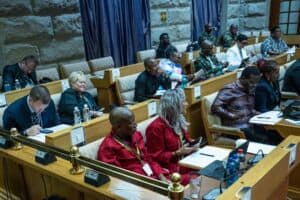The deputy president said government’s strategy was to take the vaccines closer to where people live.

Deputy President David Mabuza says government is continuing to work with traditional leaders throughout the country to encourage citizens living in rural areas to get vaccinated against Covid-19.
Mabuza on Thursday afternoon was in the National Assembly in Cape Town to reply to oral questions posed by MPs.
The deputy president, who is the chairperson of the Inter-Ministerial Committee on Covid-19 vaccines, assured parliamentarians that interfaith and traditional leaders were on board and prepared to partner with government as it ramps up its efforts to reach herd immunity.
ALSO READ: Experts emphasise the importance of vaccination ahead of Easter holidays
More than 68% of adults older than 60 years in South Africa have received their Covid-19 jabs, while only 35% of youth between 18 and 35 years have been vaccinated.
‘Take vaccines where people live’
Mabuza said government’s strategy was to take the vaccines closer to where people live, especially in remote areas, working in partnership with traditional and interfaith leaders.
“We have started the process with traditional leaders last year as we were trying very hard to reach our target in December [to achieve herd immunity]. We were together with traditional leaders, inter-faith leaders as well as traditional healers. They all agreed to partner with government to encourage our people to vaccinate,” he said.
Democratic Alliance (DA) chief whip Natasha Mazzone asked Mabuza whether government would explore the possibility of establishing a commission that would comprise traditional leaders to encourage vaccinations in rural areas.
Mabuza said he believes that government should continue working with traditional and interfaith leaders to spread the message about the safety of Covid vaccines.
He said the idea of a commission wouldn’t probably work as it would be costly for government.
“I think we should continue that way, probably putting a commission will be too expensive [and] be another structure again.
“It’s very easy to work with traditional leaders to go to their communities where people live… the strategy now is to take the vaccines where people live,” Mabuza said.
ALSO READ: Govt’s struggling vaccination drive dealt another blow over festive season
The deputy president recently held a dialogue with traditional leaders in KwaZulu-Natal on the importance of vaccines.
He said during his engagement with them he found that the provincial government was already working with traditional leaders and carrying out programmes to educate and encourage vaccinations.
Mabuza said this was also the case in other provinces like Mpumalanga and Limpopo.
“In the midst of the Covid-19 waves that we have gone through, KZN was among those provinces that were very hard hit by Covid-19. Through that partnership with traditional and interfaith leaders, we managed to pull through.”
Lessons learned
Even though government missed its target of vaccinating 67% of the adult population by the end of 2021, Mabuza said government had learned a lot from its Covid-19 vaccine rollout programme by working with different stakeholders.
“We have learned through this project to manage a pandemic and I think in the process, we’ve managed to build a very resilient and strong health system. We were not going to succeed and be where we are if we had a weak health system,” he said.
Meanwhile, it emerged this week that about the 92,370 Pfizer vaccines would be destroyed at the end of March.
The announcement of the expiring Pfizer vaccines garnered widespread criticism, with experts saying the destruction of the vials was an indictment against the management of the pandemic – both financially and in preventing illness and death.
However, the Department of Health said the volume due to expire was equivalent to 0.24% of all Pfizer doses received, which is under the World Health Organization (WHO) 10% acceptable ratio of vaccine waste.
The vaccine doses on the brink of expiring are reportedly worth at least R13 million. However, the department insisted this was not a unique problem for South Africa.
Additional reporting by Nica Richards
NOW READ: Expired Pfizer vaccines worth R13m an ‘acceptable ratio’ of waste
Support Local Journalism
Add The Citizen as a Preferred Source on Google and follow us on Google News to see more of our trusted reporting in Google News and Top Stories.








